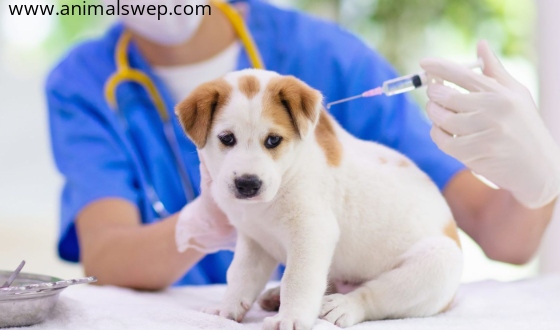The addition of a new puppy into the family is the most beautiful thing for many of us. Yet you know that your new furry puppy depends on you for everything. All the care and attention that it needs every day. For some people it can be a very formidable experience, Your new member needs suitable puppy food, a lot of attention, training, puppy toys, comfortable sleeping space and regular veterinary checkups. And it includes the most important thing, regular shots of vaccine throughout the puppy’s first year. We will discuss here the complete guide to first year puppy vaccinations.
Which shots do puppies need during first-year puppy vaccinations
Usually, parents find it inconvenient to visit the veterinarian regularly for months to follow the puppy vaccine schedule. Then the booster doses at different intervals. But the thing is that vaccination is the only shield that can save your pet child from the most deadly diseases.
We have studied so many diseases and their vaccines. Different vaccines can prevent your dog from different fatal illnesses. Sometimes it’s become confusing to know which vaccines are mandatory and which are optional. Here is an overview of some deadly diseases that can be prevented by first year puppy vaccinations.
Bordetella bronchiseptica
Highly infectious bacterial disease causes severe coughing, whooping, vomiting and in some cases convulsions and death. It also causes kennel cough in your puppy. Different vaccines in the form of injectables and nasal sprays are available. If you are planning to send your puppy to boarding, training classes or daycare services, your pup usually requires this puppy vaccine.
Canine Distemper (Recommended in First-Year Puppy Vaccinations)
A very deadly and contagious disease caused by a virus known as canine distemper virus or CDV. The virus attacks the respiratory, and digestive systems and eventually destroys the nervous system of dogs. The canine distemper virus can be transmitted through airborne exposure (through sneezing or coughing) from an infected animal. Canine Distemper disease can also be spread by sharing food, water bowls or litter trays with an infected dog. Symptoms of canine distemper disease include discharges from the eyes and nose, fever, vomiting, coughing, diarrhoea, seizures, paralysis and in most cases death is certain.
There is no specific canine distemper treatment, supportive therapy includes the prevention of secondary infection and symptoms like vomiting and diarrhoea. Infected dogs remain carriers of canine distemper virus for months. First year puppy vaccinations are the only source of prevention from this fatal disease.
Canine Hepatitis (Recommended in First Year Puppy Vaccinations)
Canine hepatitis is also an infectious disease caused by a virus which can affect the liver, lungs, kidneys, spleen and eyes of the infected animal. This disease is caused by a virus. Infectious Canine Hepatitis is not a zoonotic disease, therefore human hepatitis is a different disease. Symptoms range from mild fever and mucous membranes congestion to vomiting, and enlargement of the stomach and liver pain. Dogs can get self-treated from mild forms of canine hepatitis disease but the severe form can cause a dog to die. There is no cure for the disease so far, symptomatic treatment of canine hepatitis is the only option for veterinarians.
Canine Parainfluenza (Recommended in First Year Puppy Vaccinations)
Canine parainfluenza is also a viral disease that leads to the destruction of the respiratory tract of the dog. It is also one of the viruses which can contribute to kennel cough.
Corona Virus
Canine coronavirus does not cause COVID-19 disease in humans and COVID-19 virus does not cause any threat to dogs. The Canine Coronavirus usually affects the digestive tract of dogs but it can also cause respiratory tract infections. Canine corona virus symptoms mostly show the disturbance of the gastrointestinal tract which includes vomiting, diarrhoea and anorexia (loss of appetite). Doctors can give supportive care to keep the dog hydrated and comfortable but no drug can kill Coronavirus inside the body of dogs. The canine corona virus vaccine is the best option against this disease.
Heartworm
Heartworm is a very serious disease that can even cause the heart failure of a dog. It is caused by a parasitic worm named Dirofilaria immitis. There is no vaccine available for heartworm prevention for dogs. But after 12 to 16 weeks of age, your vet can administer the heartworm medicines for dogs. You can only prevent your dog from heartworm infestation by regularly administering the prescribed medication.
Heartworms in dogs can grow to 14 inches in size and can block the organs of a dog. Mostly these parasitic worms lodge in the right side of the heart but they can travel all the rest of the body and sometimes get into the lungs and kidneys and affect these organs too.
Heartworm may show no symptoms at the early stages of the disease. However infected dogs in later stages show heartworm symptoms and become lethargic, lose their appetite and have difficulty breathing. Heartworm disease is transmitted to a healthy pet through mosquitoes. So the confirmed diagnosis is made based on a blood test, not the faecal test.
Kennel Cough
Kennel cough in dogs also known as infectious tracheobronchitis, results from the inflammation of the respiratory tract. It can be caused by different bacterial and viral infections or other diseases like Bordetella and canine parainfluenza. In the mild form of the kennel cough disease, the dog suffers from fever and harsh dry coughing. A severe form of kennel cough symptoms can be vomiting and anorexic conditions. It can also prove deadly in rare cases. It can be transmitted easily through kennels. Antibiotics are not necessary unless your dog is suffering from a severe form of the kennel cough disease.
Leptospirosis
Leptospirosis in dogs is a bacterial disease and some dogs suffering from leptospirosis may show no symptoms at all. It is a zoonotic disease which can be found worldwide in water and soil. Leptospirosis symptoms include
- Fever
- Vomiting
- Abdominal pain
- Anorexia
- Diarrhoea
- Weakness and lethargy
- Jaundice
- Stiffness
- Kidney failure
- Muscle pain
- Infertility
Antibiotics are very effective against leptospirosis, broad-spectrum antibiotics prescribed by a veterinarian can help your dog to be fully recovered.
Lyme Disease
Lyme disease is a tick-borne disease caused by a bacterium named spirochete bacteria. It is an infectious disease which transmits through ticks. Lyme disease symptoms often show when the dog starts limping, its lymph nodes swell, the temperature rises and becomes anorexic. The disease can affect the heart, kidneys and joints of your dog, and also leads to neurological problems if remains untreated. If the disease is diagnosed in the early stages, a course of antibiotics prescribed by a doctor can be very helpful.
Parvovirus (Recommended in First-Year Puppy Vaccinations)
Canine Parvovirus is a highly contagious virus which can cause disease in all dogs but unvaccinated dogs and puppies less than 4 months of age are more susceptible to contracting the virus. This is a disease of the digestive system of dogs, The infected gastrointestinal tract parvovirus symptoms such as vomiting and loss of appetite which is accompanied by bloody diarrhoea in severe cases. Extremely dehydrated dogs can only survive for three to four days, so emergency veterinary assistance is crucial. There is no specific parvovirus treatment, so keeping dogs hydrated and secondary infection prevention is the only option. Canine parvovirus vaccine during first year puppy vaccinations schedule can save your puppy from this terrible disease.
Rabies (Recommended in First-Year Puppy Vaccinations)
Rabies is a viral disease of the central nervous system caused by Lyssavirus. It is transmitted through the bite of an infected animal. Rabies symptoms are headaches, hallucinations, excessive drooling, fear of water, paralysis and eventually death. Treatment should be done in hours after the bite otherwise death is most likely. Lyssavirus starts replicating when enters the body and slowly travels towards the central nervous system. Rabies disease becomes incurable once the neurological signs are apparent. There are different laws passed in many countries about rabies. Consult a veterinarian if you want to know further details about the laws in your area.
First Year Puppy Vaccinations Schedule
The first thing you need to know is that there is not one first year puppy vaccination schedule for all the puppies living in different circumstances. Many important factors like which country you live in, what kind of risk factors your dog is facing in its surroundings and which disease has more prevalence in your state, will also play a key role in determining the puppy vaccine schedule for your dog. So before starting any vaccination schedule discuss these all issues with your veterinarian.
Following the vaccination schedule is generally accepted for the puppy’s first year.
| Puppy Age | Recommended Vaccines | Optional Vaccines |
| 6 — 8 weeks | DHPP (vaccines for Canine distemper, Canine Hepatitis, Parvovirus and Parainfluenza) | Bordetella (Kennel Cough) |
| 10 — 12 weeks | DHPP (vaccines for Canine distemper, Canine hepatitis, Parvovirus and Parainfluenza) | Canine Influenza, Canine Leptospirosis, Bordetella, Lyme disease per lifestyle as recommended by veterinary Doctor |
| 16 — 18 weeks | Rabies, DHPP | Canine Influenza, Lyme disease, Canine Leptospirosis, Bordetella as per lifestyle |
| 12 — 16 months | Rabies, DHPP | Canine Coronavirus, Canine Leptospirosis, Lyme Disease, Bordetella. |
| Every 1 — 2 years | DHPP | Canine Influenza, Canine Coronavirus, Canine Leptospirosis, Bordetella, Lyme disease as per lifestyle. |
| Every 1 — 3 years | Rabies | DHPP (vaccines for Canine distemper, Canine Hepatitis, Parvovirus and Parainfluenza) |
Frequent Asked Questions
Puppies should typically start their vaccination series at around 6 to 8 weeks of age. The exact timing may vary depending on the specific vaccinations and the advice of your veterinarian.
The core vaccinations for first-year puppies usually include vaccination for diseases like parvovirus, distemper, hepatitis, and rabies. Non-core vaccines may also be recommended based on your puppy’s risk factors and location.
Puppies typically receive a series of vaccinations at different intervals during their first year. These are often administered every 3-4 weeks until the puppy is around 16-20 weeks old. Then boosters may be required annually or every three years, depending on the vaccine.
While vaccinations are generally safe, some puppies may experience mild side effects like lethargy and soreness at the injection site. Serious adverse reactions are rare but can occur. It’s essential to discuss any concerns with your veterinarian.
If you miss a scheduled vaccination appointment, it’s important to catch up as soon as possible to ensure your puppy’s immunity is properly established. Your veterinarian will provide guidance on the best course of action based on your puppy’s age and the specific vaccines.



